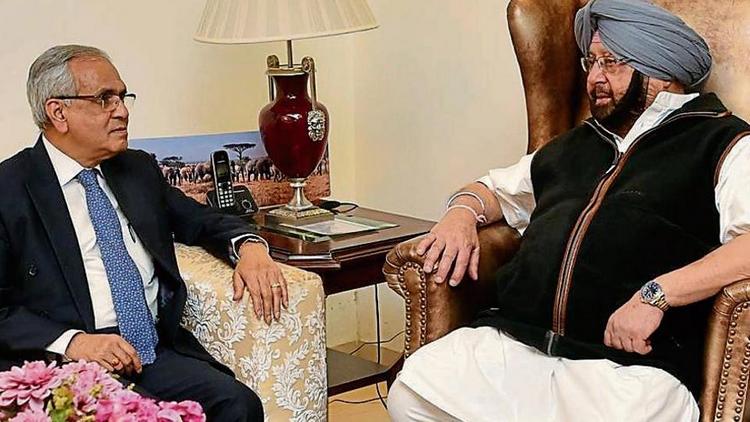Chandigarh, February 23: Key members of the government’s policy think tank, National Institution for Transforming India or NITI Aayog, on Thursday conveyed to Punjab that it can look beyond the country’s food security and, instead, urge farmers to grow crops other than the staple wheat and paddy to earn more. The focus, as set by Prime Minister Narendra Modi, is to double farmers’ income by 2022.
Aayog vice-chairman Rajiv Kumar and member Ramesh Chand met officers and leaders of Punjab to take feedback on issues. Finance minister Manpreet Singh Badal and officers of the departments of agriculture and finance who met Kumar sought Niti Aayog’s intervention for a package to the state’s peasantry.
“When we raised the issue of farming crisis, the Aayog members told us we could look beyond the wheat-paddy cycle of food security. The message is clear: state must not depend on Centre alone, and can take steps it deems necessary on its own,” said an agriculture department officer who was in the meeting but not authorised to speak to the media, adding, “Farmers are ready for the challenge.”
Rajiv Kumar later said, “We discussed high-priority areas for Punjab in the agriculture sector. Farmers here need to cut down on input cost and grow high-value crops. We are working on an action plan for the state. I have asked for discussions from the state.” Manpreet was more upfront at the press briefing: “In the name of national food security, Punjab should not be victimised. Our farmers are in crisis; the soil and aquifers are exhausted.”
Punjab has for five decades been contributing majorly to the national food bowl. While the figure once stood at 60% of the country’s rice (paddy) and nearly 80% of the wheat, in the 2016-17 season the state contributed 29% of the rice and 38% of the wheat. This, when Punjab is 2.4% of the country’s area, and has just 0.7% of the country’s farmers. The farmers are in a debt crisis, though. As per figures quoted by different agencies, including the state government, total debt on the state’s peasantry is Rs 90,000 crore, while overall debt on the nation’s farmers is estimated at Rs 11 lakh crore.
Punjab’s farmers are dependent on the minimum support price (MSP) offered by the Centre on wheat and paddy. But the farmers and the state government have been seeking MSP as per the Swaminathan formula: 50% profit over input cost, including family labour cost and land’s potential revenue. For now, land potential is not taken into account while calculating input cost, even though the Centre says it will follow the 50% formula.
The visiting team of Niti Aayog was also told that Punjab’s government loses Rs 1,800 crore every year in procurement of wheat and paddy. “We offered that they (Centre) should take charge of procurement, and it be done by the Food Corporation of India (FCI),” said Manpreet.
Six state-owned procurement agencies procure wheat and paddy on behalf of the Centre using cash credit limit sanctioned by the Union ministry of finance through Reserve Bank of India. These agencies pass on the foodgrains to the FCI for distribution to other states too.
The state government in 2016 owned up Rs 31,000 crore as term loan for 20 years — this figure was actually the difference between CCL funds received and the grains procured. Every month, the state repays Rs 270 crore thus.
Speaking on other issues discussed, Manpreet said Niti Aayog was asked to take up flood-control measures on the border with Pakistan. The members, according to the FM, were also urged to frame policies keeping needs of Punjab in view . The issues, as per a government release, included funds for Stage 2 of Shahpur Kandi Dam project and lining of the Sirhind canal and Rajasthan feeder. Also, the state sought increase in Centre’s contribution to 90%, from the current 60%, to the border area development fund.
Asked about the issue, farm economist Sardara Singh Johl said, “This shift of focus is an indirect way to telling Punjab that ‘we don’t need your grain’. To to fill the gap, eastern states are coming up in a big way.”
He lamented, “Despite alerts to successive governments in Punjab not to depend on MSP of wheat and paddy, and to grow other crops, the situation has been allowed to reach this level.”
Source Hindustan Times
Discussions
Discussions
